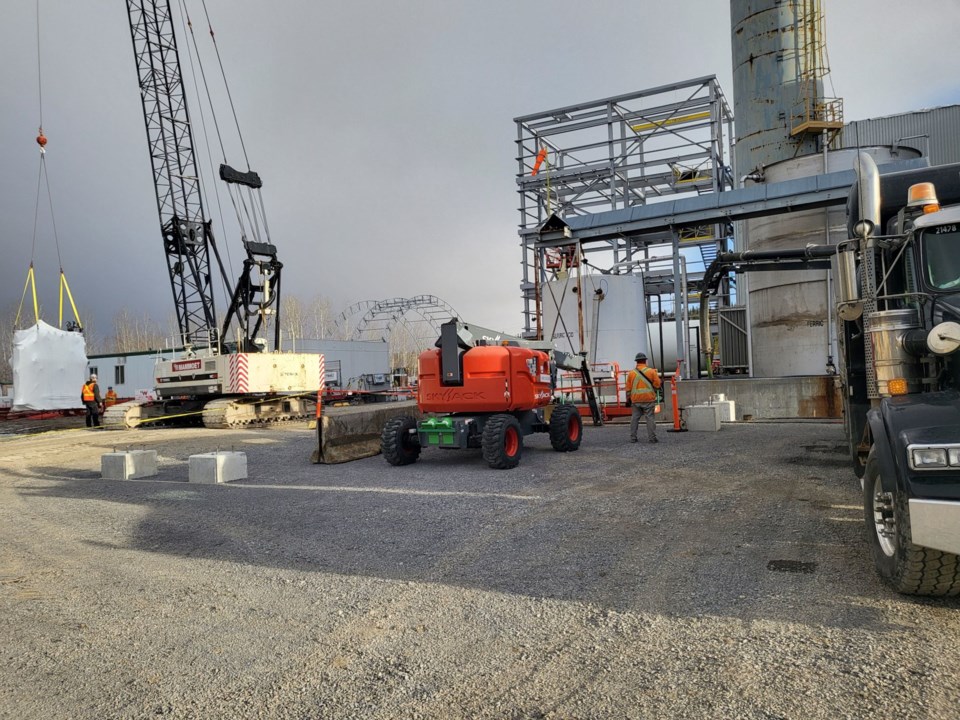Electra Battery Materials will looking to its industry partners and government funders for help in finishing the construction of its Temiskaming cobalt refinery.
Trent Mell, CEO of the fledgling Toronto mineral processing company said it’s going to “pause or slow down” the project until there's a clearer "capital solution” in place to complete the project.
The cost to finish the cobalt sulfate refinery is $161 million. More than $81 million has been spent to date, as Electra posted in its second quarter results in a conference call late last week.
Electra’s plans are to build a battery metals park on the site of an existing refinery located between the Town of Cobalt and Temiskaming Shores. The company is refurbishing and expanding the facility. Its goal is to be a supplier of a wide spectrum of battery-grade materials to the North American auto industry.
2022 was a tough year for the company as inflation, supply chain issues and other difficulties delayed the completion of the cobalt refinery and elevated its price tag, prompting a project review.
The company focus, the company said, has been on getting costs under control by reducing executive salaries and staff to 30 people, as well as curbing procurement spending.
Electra was recently successful in raising $21 million in financing through two private placements, but Mell said he’ll be spending the next six months looking to other sources to fill an $80 million (US $60 million) funding gap.
The company provided no timelines as to when funding might arrive, but when it does, Mell confirmed to analysts that the cobalt refinery could be finished within 12 months.
Even with depressed cobalt prices, Mell pointed out Electra’s order book is filling up fast.
The company struck its first major commercial supply agreement for cobalt sulfate last September with LG Energy Solution, the world’s biggest EV battery maker outside China.
Last month, LG upsized the offtake deal from three-year, 7,000 tonnes to five years, 19,000 tonnes, the latter taking up 80 per cent of Electra’s proposed production. Deliveries to LG start in 2025.
“We've got about US$620 million worth of cobalt under contract with this,” said Mell.
Want to read more stories about business in the North? Subscribe to our newsletter.
Mell expects there to be “heightened” competition to scoop up the remaining 20 per cent, short of a plant expansion to boost their initial production run from 5,000 tonnes year to 6,500.
”Electra is just about sold out,” he said.
While there’s plenty of market interest in their product, Melll said the connection between the mining industry and battery supply chain can’t be linked without funding for mid-stream processing.
“This is a gaping hole in our supply chain on this side of the world.”
Mell mentioned there are companies on both sides of the border that have received government funding through the U.S. Inflation Reduction Act and similar programs in Canada and, “I think those recipients need to work with us on a capital solution.”
Federal and provincial governments are sinking millions of dollars into giga-factories in southwestern Ontario and are making big splash funding announcements into a burgeoning battery park in Bécancour, Que.
Electra has been invited by Investment Quebec and the Canadian government to set up a second cobalt refinery in the St. Lawrence River port city.
“Bécancour is very much on the radar for us,” said Mell.
Next year, Electra will release more details in a prefeasibility study of what that development would look like.
What’s really taking off for Electra in Temiskaming is its ‘black mass’ battery waste recycling operation.
Launched as a demonstration plant last year to field-test its technology, Electra is declaring it a success in terms of metal recovery and the improvement in the processing.
The first customer shipment of a nickel-cobalt MHP (mixed hydroxide precipitate) product was announced in July.
Black mass is a mineral-rich material that's inside spent lithium-ion batteries that includes nickel, cobalt, lithium and manganese.
Plans are afoot to eventually ramp it to a continuously operating facility.
To lock in a long-term supply of black mass, Electra signed a memorandum of understanding toward establishing a joint venture with the Three Fires Group, an Indigenous regional economic development group in southwestern Ontario.
The proposed southern Ontario battery shredding operation would collect waste material from battery cell plants now under construction in St. Thomas and Windsor. The powder 'black mass' material would be shipped to Temiskaming where the individual minerals would be separated out and shipped back to the giga-factories in a closed loop system. Three Fires has committed $10 million toward this partnership.
Mell said talks will resume later this summer or fall to formalize this joint venture.




